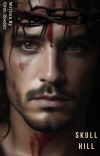
The courtyard of the Praetorium was soaked in sunlight, casting a warm glow on the faces of the Roman soldiers who lined its perimeter. But for Jesus, standing bound to a low wooden post at the center, the light seemed cruelly ironic—a bright stage for an impending act of unimaginable darkness.
His robe had been removed, leaving Him in nothing but bare skin. His back was exposed, vulnerable. The soldiers who stood before Him held in their hands the flagrum, a whip fitted with multiple strands, each ending in bits of bone or metal. They eyed Him with a detached curiosity, as though He were an object, a thing, not a man of flesh and blood.
The order was given, and the first soldier stepped forward, swinging the flagrum with calculated force. It struck Jesus' back with a sickening, wet slap, the ends digging into His flesh before being yanked away, tearing skin and muscle as they went. A gasp escaped from His lips, but He held His composure, tightening His jaw in anticipation of the next blow.
Another lash came, then another, each one leaving its own horrific signature—a patchwork of agonizing welts and deepening bruises, cuts that bled freely, mingling with the sweat that trickled down His spine. The air was filled with the sounds of leather slicing through the air, flesh being torn, and the occasional stifled cry from Jesus, each one imbued with an otherworldly restraint.
The soldiers took turns, their faces flushed from exertion, their arms aching, but their resolve steeled by the atmosphere of sadistic exhilaration that hung in the air. The ground beneath Jesus grew dark with His blood, each droplet a testament to His humanity, His vulnerability, His suffering.
Yet, through it all, Jesus' eyes remained focused, as though He were looking past the immediate horror, past the courtyard and the gleeful faces of His tormentors, into a realm the others could not see. His lips moved silently, a litany of prayers or perhaps conversations with a Father only He could sense in that dreadful moment.
His back was now a canvas of torment, each lash a stroke in a grim masterpiece of suffering. The muscle and sinew lay exposed, and yet, by some miracle, He remained conscious, His spirit unbroken even as His body was shattered.
Finally, after what seemed like hours, the order was given to stop. The soldiers spent and sweating, stepped back to admire their work. A strange silence descended upon the courtyard—a pause, a breath, a momentary respite in the face of what was yet to come.
They draped a purple robe over Jesus' mangled back, pressing the fabric into His wounds, causing Him to wince at the fresh wave of pain. Then came the crown of thorns, pushed down onto His head with mocking ceremony, each thorn piercing deep into his scalp with a sharp, hot burst of agony.
Jesus was untied from the post, His legs nearly giving way beneath Him as He was led back into the Praetorium. The crowd awaited His return, their faces a mix of curiosity, pity, and revulsion. Little did they know that the act they had just witnessed, as brutal as it was, was just the beginning.
As He emerged, His face was a mask of blood and pain, but His eyes—those penetrating, inscrutable eyes—held something else entirely. Was it resignation? Sorrow? Or perhaps a glimmer of the divine knowledge that this was necessary?
And so, Jesus, the man of sorrows, acquainted with grief, took His first steps on the long, torturous road to Golgotha.


